1992 VOLKSWAGEN TRANSPORTER Page 97
[x] Cancel search: Page 97Page 105 of 164
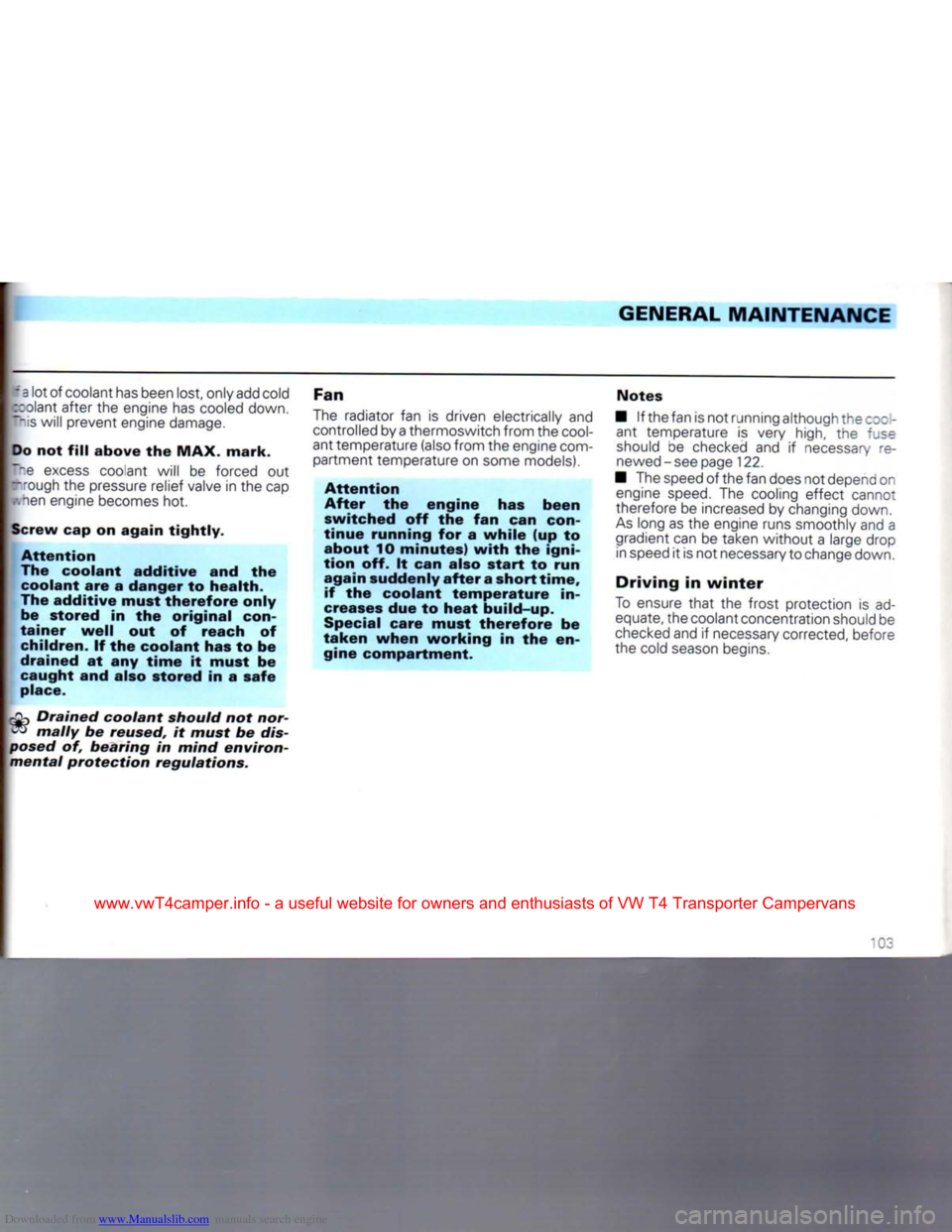
Downloaded from www.Manualslib.com manuals search engine
GENERAL
MAINTENANCE
"=
lot
of
coolant has been lost, only add cold
:_:olant after
the
engine has cooled down.
~~
is
will prevent engine damage.
Do
not
fill
above the MAX. mark.
~~e
excess
coolant will
be
forced
out
"rough
the
pressure relief valve
in the
cap .-.nen engine becomes
hot.
Screw
cap on again tightly. Attention
The coolant additive and the coolant are a danger to health.
The additive must therefore only be stored in the original
con
tainer
well
out of reach of
children.
If the coolant has to be
drained at any
time
it must be
caught and also stored in a safe
place.
Drained
coolant
should
not nor-
W*
mally
be
reused,
it
must
be
dis
posed
of,
bearing
in
mind
environ
mental
protection
regulations.
Fan
The radiator
fan is
driven electrically
and
controlled by a thermoswitch from the
cool
ant temperature (also from the engine
com
partment temperature on some models).
Attention
After the engine has been
switched off the fan can
con
tinue running for a
while
(up to
about 10 minutes)
with
the igni
tion off. It can also
start
to run
again suddenly
after
a short time, if the coolant temperature in
creases
due to
heat
build-up.
Special
care must therefore be
taken when working in the en gine compartment. Notes
•
If
the fan is not running although the
cool
ant temperature
is
very high,
the rse
should
be
checked
and if
necessary
re
newed
-
see page 122.
• The speed
of
the fan does not depeno
or
engine
speed.
The
cooling effect cannot
therefore
be
increased
by
changing down.
As
long as
the
engine runs smoothly and
a
gradient can
be
taken
without
a
large drop in speed
it
is not necessary to change down.
Driving in
winter
To
ensure
that
the
frost protection
is ad
equate, the coolant concentration should be
checked
and
if
necessary corrected, before
the cold
season
begins.
www.vwT4camper.info - a useful website for owners and enthusiasts of VW T4 Transporter Campervans
Page 107 of 164
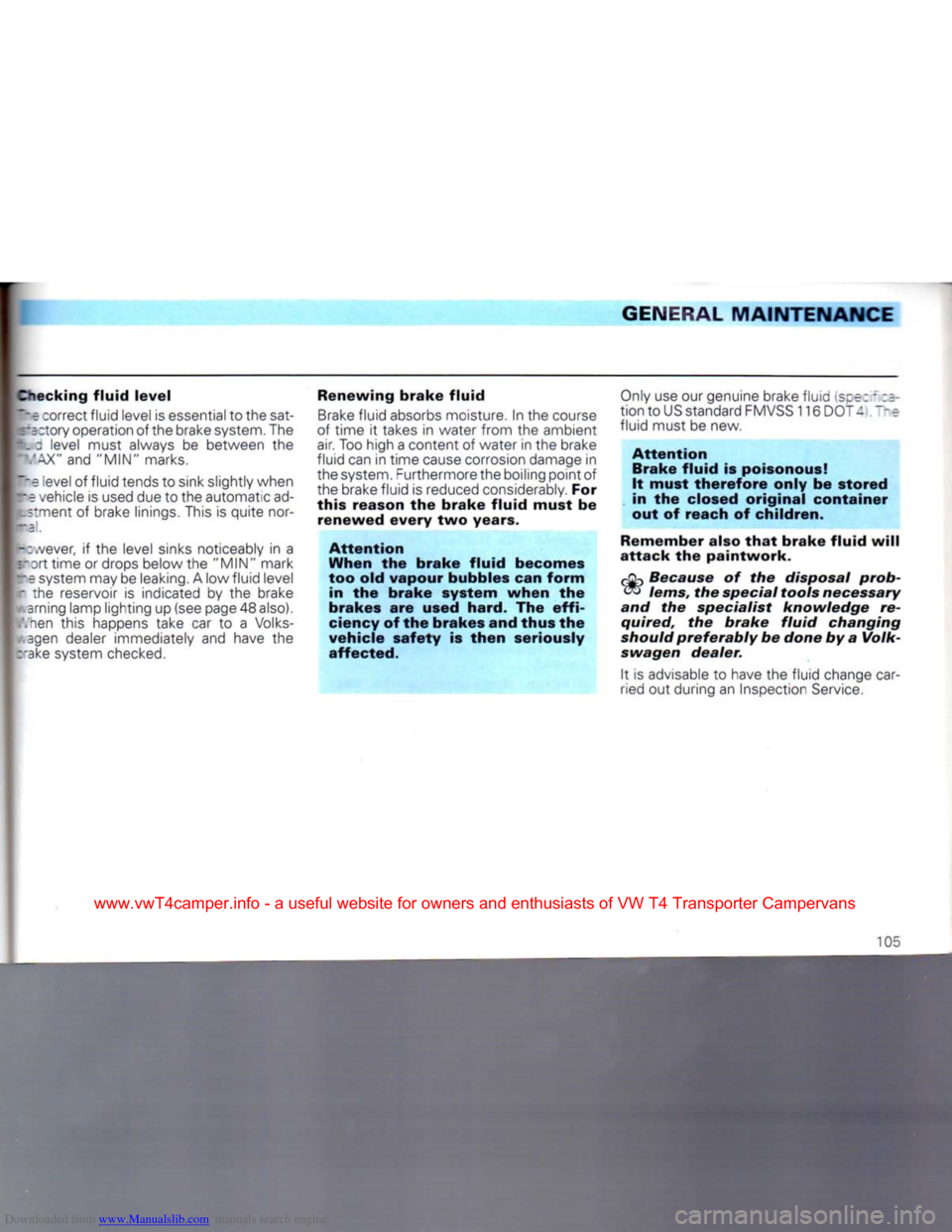
Downloaded from www.Manualslib.com manuals search engine
GENERAL
MAINTENANCE
'necking fluid level
Pe :orrect fluid level is essential to the sat-
:~=
:tory operation of the brake system. The
fc. Z level must always be between the
AX"
and "MIN" marks.
~- a "evel of fluid tends to sink slightly when
"a vehicle is used due to the automatic ad- ::ment of brake linings. This is quite nor-
-rwever, if the level sinks noticeably in a
srorttime or drops below the "MIN" mark
re system may be leaking. A low fluid level " the reservoir is indicated by the brake
w.arning lamp lighting up (see page 48 also), .nen this happens take car to a Volks
wagen dealer immediately and have the
cake system checked. Renewing brake fluid
Brake fluid absorbs moisture. In the course
of time it takes in water from the ambient
air. Too high a content of water in the brake
fluid can in time cause corrosion damage in
the system. Furthermore the boiling point of
the brake fluid is reduced considerably. For
this reason the brake fluid must be renewed every two years.
Attention
When the brake fluid becomes
too old vapour bubbles can form in the brake system when the
brakes are used hard. The
effi
ciency of the brakes and thus the
vehicle safety is then seriously
affected.
Only use our genuine brake fluio (see: - ra
tion to US standard FMVSS 116 DO~-
.
~-e
fluid must be new.
Attention Brake fluid is poisonous!
It must therefore only be stored in the closed original container
out of reach of children.
Remember also that brake fluid will
attack the paintwork. Because of the disposal
prob
lems,
the special tools necessary
and the specialist knowledge re
quired,
the brake fluid changing
should preferably be done by a
Volk
swagen
dealer.
It is advisable to have the fluid change car
ried out during an Inspection Service.
www.vwT4camper.info - a useful website for owners and enthusiasts of VW T4 Transporter Campervans
Page 108 of 164
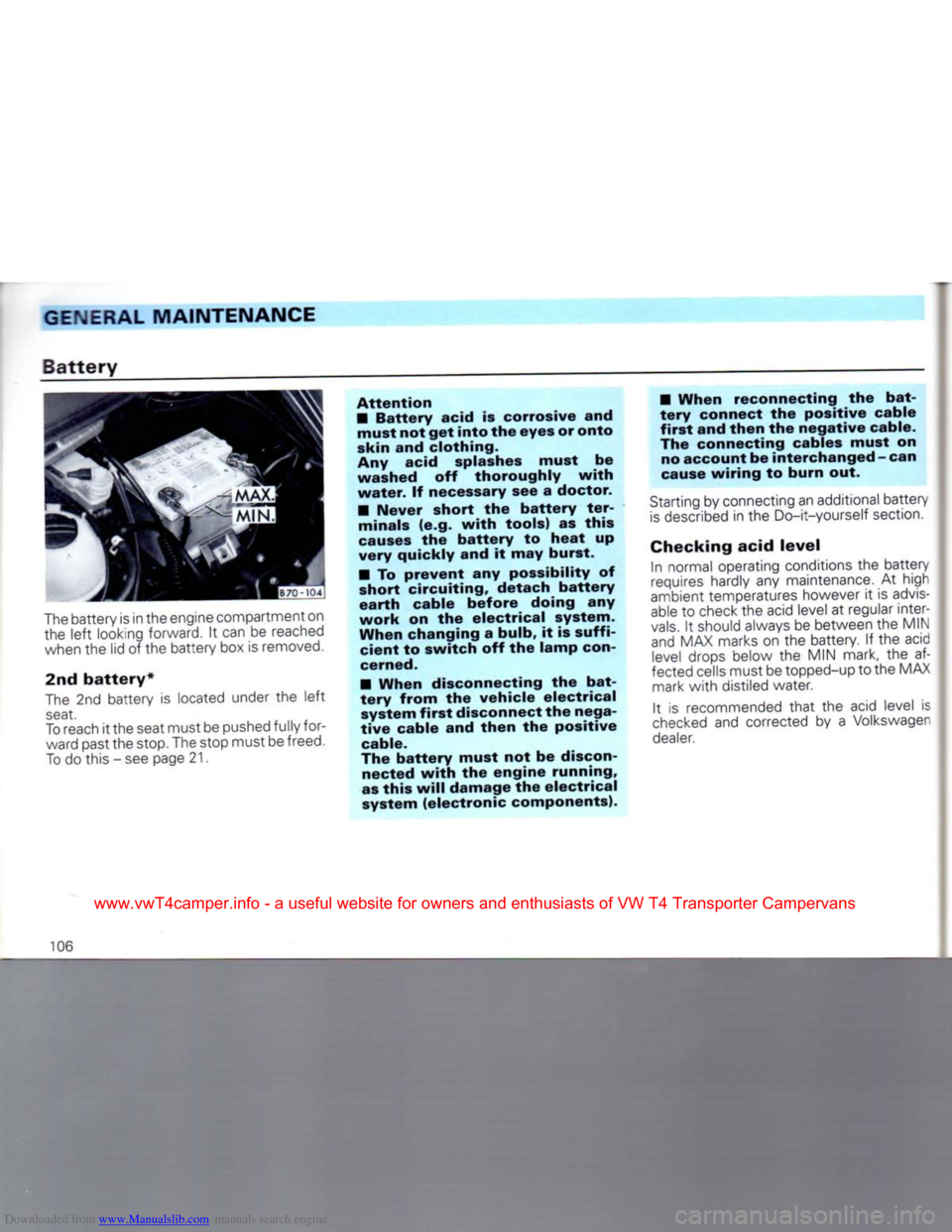
Downloaded from www.Manualslib.com manuals search engine
GENERAL
MAINTENANCE
Battery
The
battery is in the engine compartment on
the left looking forward. It can be
reached
when
the lid of the battery box is
removed.
2nd
battery*
The
2nd battery is located under the left
seat.
To
reach
it the
seat
must be
pushed
fully for
ward
past the stop. The stop must be
freed.
To
do this - see page 21. Attention
•
Battery
acid is corrosive and must not get
into
the eyes or onto
skin and clothing.
Any
acid splashes must be
washed off thoroughly
with
water.
If necessary see a doctor.
•
Never short the
battery
ter
minals (e.g.
with
tools) as this
causes
the
battery
to
heat
up
very quickly and it may burst.
•
To prevent any possibility of
short circuiting, detach
battery
earth
cable before doing any
work
on the electrical system.
When changing a bulb, it is sufficient to switch off the lamp
con
cerned.
•
When disconnecting the
bat
tery
from the vehicle electrical system
first
disconnect the nega
tive
cable and
then
the positive cable.
The
battery
must not be discon nected
with
the engine running,
as this
will
damage the electrical
system (electronic components).
•
When reconnecting the
bat
tery
connect the positive cable
first
and
then
the negative cable.
The connecting cables must on no account be interchanged - can
cause
wiring
to burn out.
Starting
by
connecting
an additional battery
is
described
in the Do-it-yourself
section.
Checking
acid level In normal operating conditions the battery
requires
hardly any maintenance. At high
ambient
temperatures however it is
advis
able
to
check
the
acid
level at regular inter
vals.
It should always be between the MIN
and
MAX marks on the battery. If the
acid
level
drops below the MIN mark, the af
fected
cells
must be topped-up to the MAX
mark
with distiled water.
It is recommended that the
acid
level is
checked
and corrected by a
Volkswager
dealer.
106
www.vwT4camper.info - a useful website for owners and enthusiasts of VW T4 Transporter Campervans
Page 109 of 164
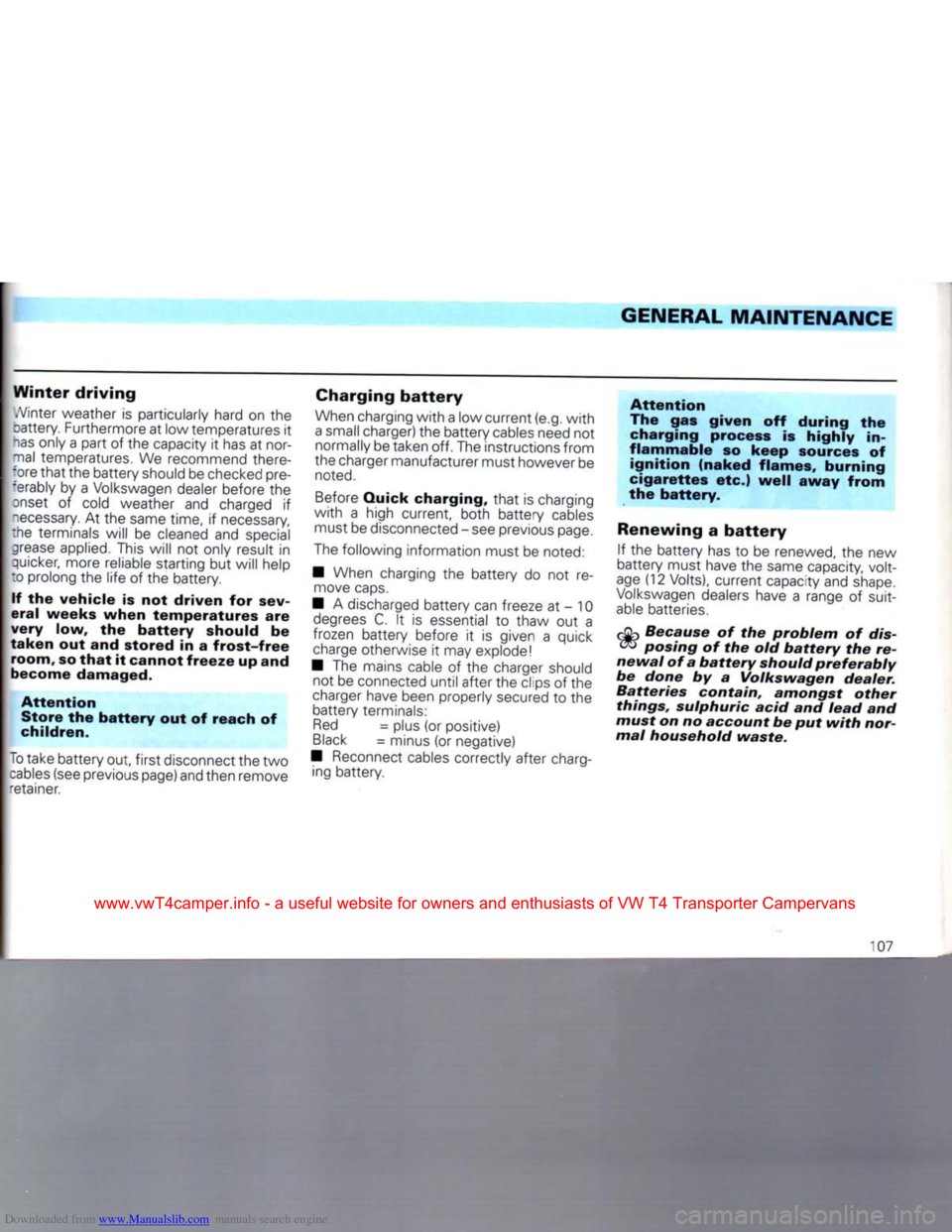
Downloaded from www.Manualslib.com manuals search engine
GENERAL
MAINTENANCE
Winter
driving
A/inter weather
is
particularly hard
on the
cattery. Furthermore at low temperatures
it
has
only a part
of
the capacity
it
has
at
nor mal temperatures.
We
recommend there-
-'ore
that
the battery should be checked pre
ferably
by a
Volkswagen dealer before
the
onset
of
cold weather
and
charged
if
"ecessary.
At
the same time,
if
necessary,
the terminals will
be
cleaned
and
special
grease
applied. This will
not
only result
in
quicker, more reliable starting but will help
:o prolong the life
of
the battery.
If the
vehicle
is not
driven
for
sev
eral
weeks
when
temperatures
are
very
low, the
battery
should
be
taken
out
and
stored
in a
frost-free
room, so
that
it
cannot
freeze
up and
become damaged.
Attention
Store
the
battery
out of
reach
of
children.
To
take battery out,
first
disconnect the two
cables
(see previous page) and then remove
-etainer.
Charging
battery
When
charging
with
a low current (e.g.
with
a
small charger) the battery cables need not normally be taken off. The instructions from
the charger manufacturer must however be
noted.
Before
Quick charging,
that
is
charging
with
a
high current, both battery cables must be disconnected
-
see previous page.
The
following information must be noted:
• When charging
the
battery
do not re
move
caps.
•
A
discharged battery can freeze
at - 10
degrees
C. It is
essential
to
thaw
out a
frozen battery before
it is
given
a
quick
charge
otherwise
it
may explode!
• The mains cable
of the
charger should not be connected until after the clips
of
the
charger
have been properly secured
to the
battery terminals:
Red
=
plus
(or
positive)
Black
=
minus
(or
negative)
• Reconnect cables correctly after charg ing battery.
Attention
The
gas
given
off
during
the
charging process
is
highly
in
flammable
so
keep
sources
of
ignition
(naked
flames,
burning
cigarettes
etc.)
well
away
from
the
battery.
Renewing
a battery If the
battery has
to be
renewed,
the
new
battery must have the same capacity, volt
age
(12 Volts), current capacity and shape.
Volkswagen
dealers have
a
range
of
suit
able
batteries.
Because
of the
problem
of
dis
posing
of
the
old
battery
the re
newal
of
a
battery
should
preferably
be
done
by a
Volkswagen
dealer.
Batteries
contain,
amongst
other
things,
sulphuric
acid
and
lead
and
must
on no
account
be put
with
nor
mal
household
waste.
107
www.vwT4camper.info - a useful website for owners and enthusiasts of VW T4 Transporter Campervans
Page 112 of 164
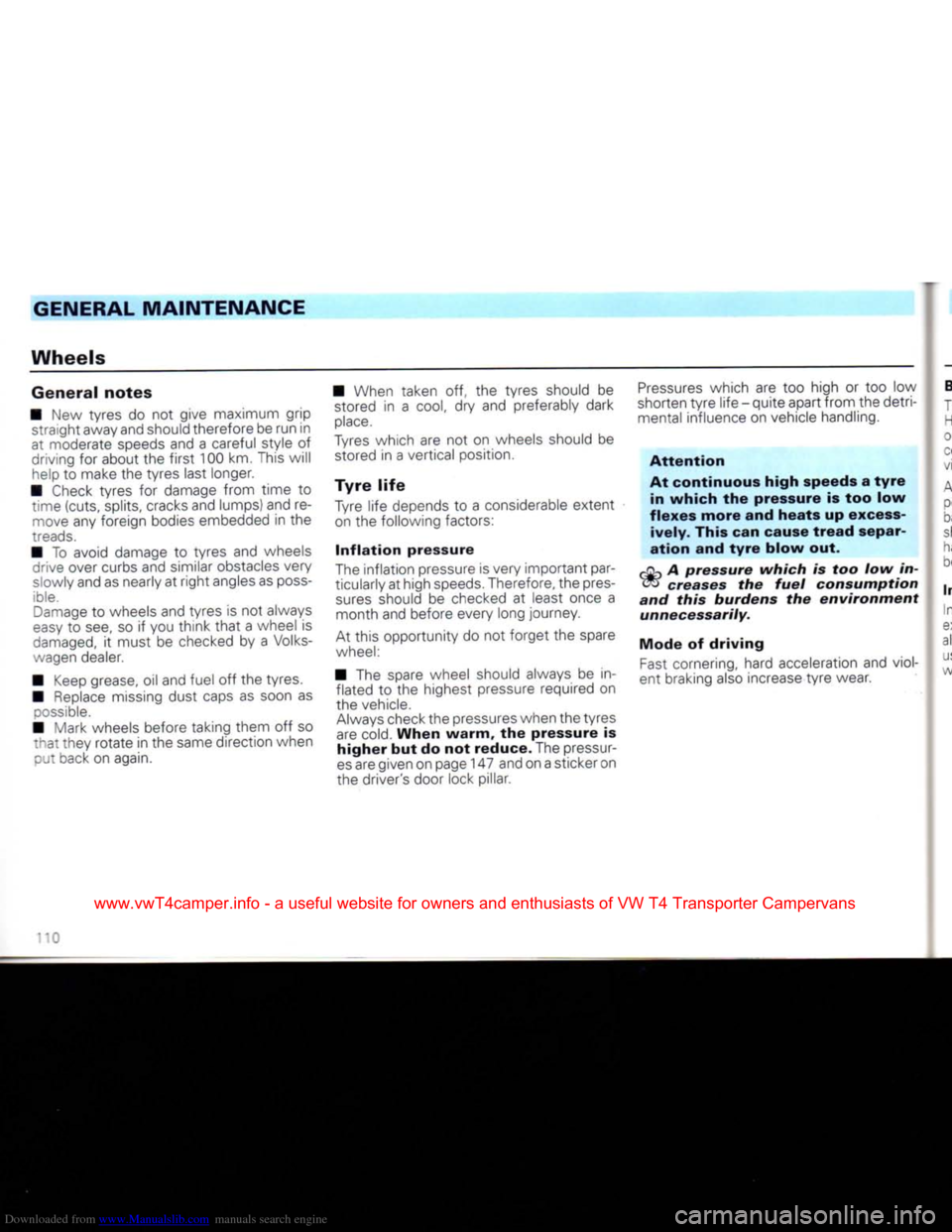
Downloaded from www.Manualslib.com manuals search engine
GENERAL
MAINTENANCE
Wheels
General
notes
• New tyres do not give maximum grip straight away and should therefore be run in
at moderate speeds and a careful style of
driving for about the
first
100 km. This will help to make the tyres last longer.
• Check tyres for damage from time to time (cuts, splits, cracks and lumps) and remove any foreign bodies embedded in the
treads.
• To avoid damage to tyres and wheels crive over curbs and similar obstacles very
slowly and as nearly at
right
angles as
poss
ible.
Damage
to wheels and tyres is not always
easy
to see, so if you
think
that
a wheel is
damaged,
it must be checked by a Volks
wagen dealer.
• Keep grease, oil and fuel off the tyres.
• Replace missing dust caps as soon as
possible.
• Mark wheels before taking them off so
that
they rotate in the same direction when put back on again. • When taken off, the tyres should be
stored in a
cool,
dry and preferably dark
place.
Tyres
which are not on wheels should be stored in a vertical position.
Tyre
life
Tyre life depends to a considerable extent on the following factors:
Inflation
pressure
The inflation pressure is very important par
ticularly at high
speeds.
Therefore, the pres
sures
should be checked at least once a month and before every long journey.
At this opportunity do not forget the spare
wheel:
• The spare wheel should always be in flated to the highest pressure required on
the vehicle.
Always
check the pressures when the tyres are cold.
When
warm,
the pressure is
higher
but do not
reduce.
The pressur
es
are given on page 147 and on a sticker on
the driver's door lock pillar.
Pressures
which are too high or too low
shorten
tyre
life - quite apart from the detri mental influence on vehicle handling.
Attention
At
continuous
high
speeds a
tyre
in
which
the pressure is too low
flexes
more
and
heats
up excess
ively.
This can cause
tread
separ
ation
and
tyre
blow
out.
pCU
A
pressure
which
is too low in- oo
creases
the
fuel
consumption
and
this
burdens
the
environment
unnecessarily.
Mode
of
driving
Fast
cornering, hard acceleration and viol
ent braking also increase
tyre
wear.
'0
www.vwT4camper.info - a useful website for owners and enthusiasts of VW T4 Transporter Campervans
Page 116 of 164

Downloaded from www.Manualslib.com manuals search engine
GENERAL
MAINTENANCE
Winter
tyres
In winter conditions winter tyres will dis
tinctly improve the vehicle's handling. This
applies
in particular to vehicles that are
equipped
with wide tyres.
Because
of their
construction (width, rubber mixture, tread
formation etc.) these tyres provide
less
trac
tion on ice and snow.
When
fitting
winter tyres note the follow
ing:
• Only radial ply winter tyres may be fitted.
The
factory recommended tyre
sizes
are
givenonpagel
46.
• To obtain the best possible handling
characteristics,
winter tyres must be
fitted
on all four wheels. • Winter tyres are no longer fully effective
when the tread has worn down to a depth
of 4 mm.
• All-weather tyres can also be used in
stead
of winter tyres.
• If you have a
flat
tyre the remarks on
using
the spare wheel on page 112 should
be
noted.
• Do not leave winter tyres
fitted
for an un
necessary
long period because when the
roads
are free of snow and ice the handling
with summer tyres is better.
For
environmental
reasons
summer
tyres
should
be
fitted
again
as soon as possible
because
normally
they
are
quieter
in
running,
tyre
wear
is
reduced
and the
fuel
consumption is
lower.
Snow chains
Snow chains may only be
fitted
on
the
front
wheels.
Snow
chains must not be
fitted
on 215/65 F
16
tyres. When
necessary
the vehicle mus:
be
equipped with smaller tyres - see
Wheels,page146.
Only
use thin chains which do not stanc
clear
more than 15 mm (including ten-
sioner).
When
using snow chains wheel
trim
plates
and
trim
rings must be taken off. For safet
reasons
the wheel bolts must then be f ittec
with caps which are available from
Volks
wagen
dealers.
When
driving over roads which are free of
snowyou
must remove the
chains.
On such
roads
they are detrimental to vehicle handl
ing,
damage the tyres and wear out quickly.
In Germany, the maximum permissible
speed
with snow chains is 50 km/h.
114
www.vwT4camper.info - a useful website for owners and enthusiasts of VW T4 Transporter Campervans
Page 117 of 164
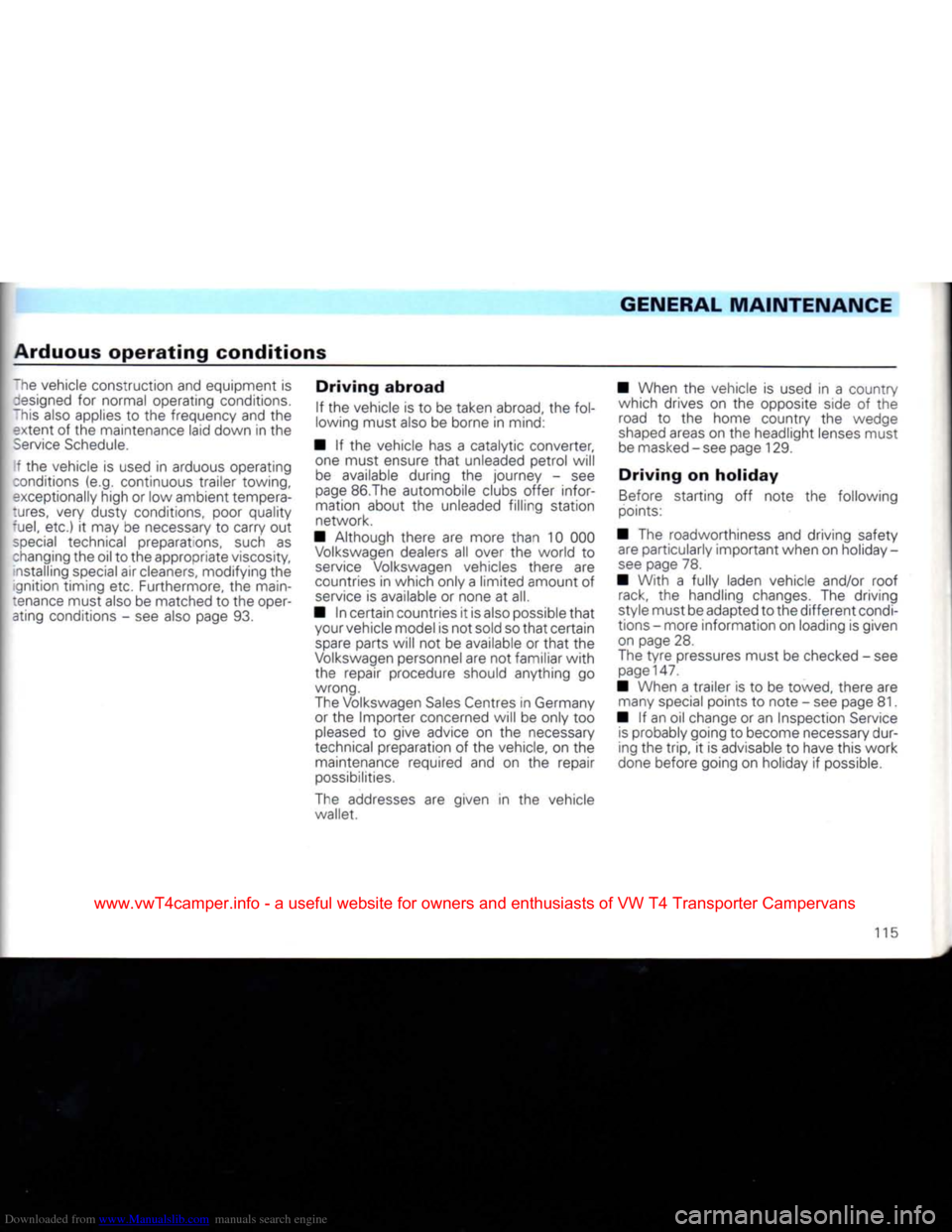
Downloaded from www.Manualslib.com manuals search engine
GENERAL
MAINTENANCE
Arduous
operating
conditions
ne vehicle construction and equipment is
resigned for normal operating conditions.
his also applies to the frequency and the
extent of the maintenance laid down in the
service
Schedule.
f the vehicle is used in arduous operating
conditions (e.g. continuous trailer towing,
exceptionally high or low ambient tempera-
:ures,
very dusty conditions, poor quality
ruel,
etc.) it may be necessary to carry out
special
technical preparations, such as ;hanging the oil to the appropriate viscosity, ^stalling special air cleaners, modifying the
ignition timing etc. Furthermore, the main
tenance must also be matched to the oper
ating conditions - see also page 93.
Driving
abroad
If the vehicle is to be taken abroad, the fol
lowing must also be borne in mind:
• If the vehicle has a catalytic converter, one must ensure
that
unleaded petrol will be available during the journey - see
page 86.The automobile clubs offer infor mation about the unleaded filling station
network.
• Although there are more than 10 000
Volkswagen
dealers all over the world to
service
Volkswagen vehicles there are
countries in which only a limited amount of
service
is available or none at all.
• In certain countries it is also possible
that
your vehicle model is not soid so
that
certain
spare
parts will not be available or
that
the
Volkswagen
personnel are not familiar
with
the repair procedure should anything go
wrong.
The Volkswagen
Sales
Centres in Germany or the
Importer
concerned will be only too
pleased
to give advice on the necessary
technical preparation of the vehicle, on the maintenance required and on the repair
possibilities.
The addresses are given in the vehicle wallet. • When the vehicle is used in a country
which drives on the opposite side of the road to the home country the wedge
shaped
areas on the headlight lenses must be masked - see page 129.
Driving
on
holiday
Before starting off note the following
points:
• The roadworthiness and driving safety are particularly important when on holiday-
see
page 78.
• With a fully laden vehicle and/or roof rack, the handling changes. The driving
style must be adapted to the different condi
tions - more information on loading is given
on page 28.
The
tyre
pressures must be checked - see
page147.
• When a trailer is to be towed, there are many special points to note - see page 81.
• If an oil change or an Inspection Service
is
probably going to become necessary dur
ing the
trip,
it is advisable to have this work
done before going on holiday if possible.
115
www.vwT4camper.info - a useful website for owners and enthusiasts of VW T4 Transporter Campervans
Page 118 of 164
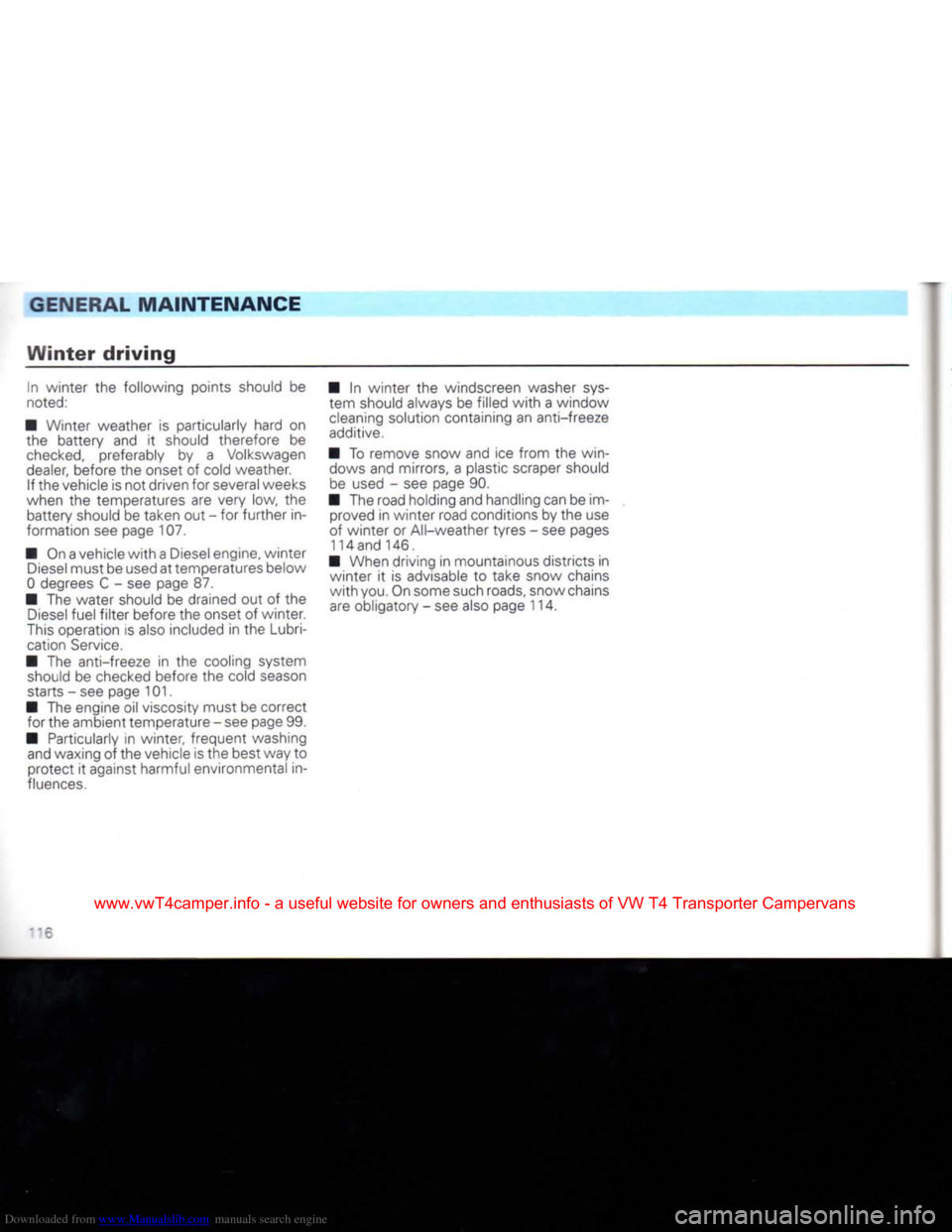
Downloaded from www.Manualslib.com manuals search engine
GENERAL
MAINTENANCE
Winter
driving
T
Ac
The an«
safe
high
ensi
supf
with
poin
sub:
tech latei
• /
fori
any
thro
SWc
pete
A
In
m
s<
V
G
u
P
SI
a
s|
r<
In winter the following points should be
noted:
• Winter weather is particularly hard on the
battery
and it should therefore be
checked,
preferably by a Volkswagen
dealer, before the onset of cold weather. If the vehicle is not driven for several weeks
when the temperatures are very low, the
battery
should be taken out - for
further
in
formation see page 107.
• On a vehicle
with
a Diesel engine, winter
Diesel
must be used at temperatures below
0 degrees C - see page 87.
• The water should be drained out of the
Diesel
fuel
filter
before the onset of
winter.
This
operation is also included in the Lubri cation
Service.
• The anti-freeze in the cooling system should be checked before the cold
season
starts - see page 101.
• The engine oil viscosity must be correct for the ambient temperature - see page 99.
• Particularly in
winter,
frequent washing and waxing of the vehicle is the best way to protect it against harmful environmental in
fluences.
• In winter the windscreen washer
sys
tem should always be filled
with
a window
cleaning solution containing an anti-freeze
additive.
• To remove snow and ice
from
the win dows and mirrors, a plastic scraper should be used - see page 90.
• The road holding and handling can be im proved in winter road conditions by the use
of winter or All-weather tyres - see pages 114and146.
• When driving in mountainous districts in winter it is advisable to take snow chains
with
you. On some such roads, snow chains
are obligatory - see also page 114.
www.vwT4camper.info - a useful website for owners and enthusiasts of VW T4 Transporter Campervans